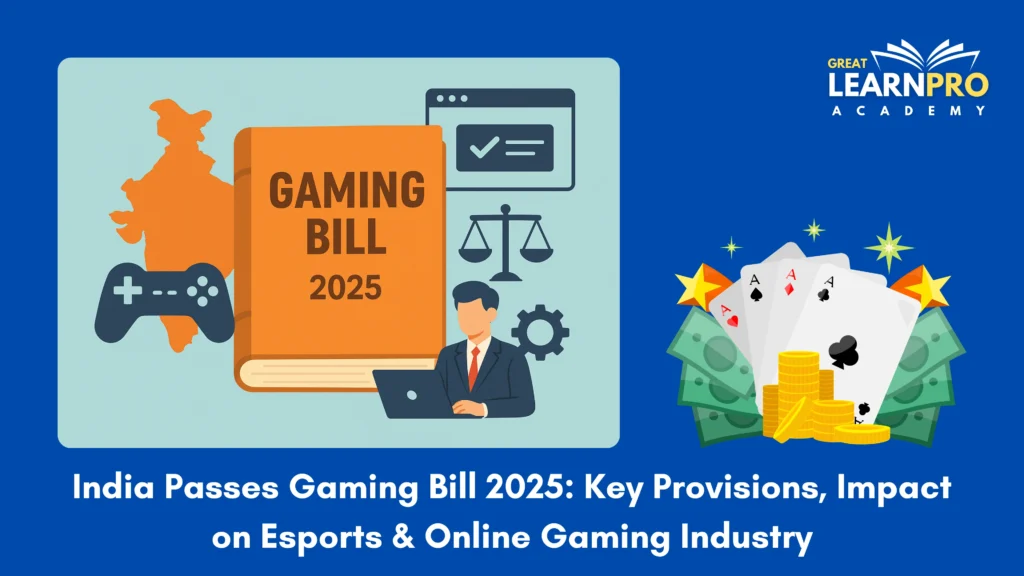
The Indian Parliament recently passed the Gaming Bill, 2025, a landmark legislation aimed at regulating the rapidly growing digital gaming sector in the country. With online gaming expanding exponentially due to increasing internet penetration, smartphone usage, and global investments, the new law seeks to establish a clear regulatory framework that balances innovation, economic growth, and player protection.
Context and Need for the Bill
India’s online gaming industry has witnessed unprecedented growth in recent years. Industry estimates suggest the sector could be worth over $8.5 billion by 2027, creating millions of jobs and attracting significant foreign investment. However, the rapid expansion has also raised concerns over gambling addiction, financial fraud, data security, underage gaming, and lack of uniform regulation.
Previously, regulation was fragmented, with states adopting differing laws. Some, like Tamil Nadu and Telangana, banned real-money online games, while others permitted them with minimal oversight. This patchwork of laws created uncertainty for businesses and confusion for consumers. The Gaming Bill, 2025, attempts to harmonize these regulations at the national level, ensuring consistency while leaving states room to adapt within the broader framework.
Key Provisions of the Gaming Bill, 2025
- Central Regulatory Authority
- The Bill establishes the National Gaming Authority (NGA) as the nodal body to regulate the sector.
- The NGA will frame rules, issue licenses, monitor compliance, and take enforcement actions.
- Classification of Games
- A crucial provision distinguishes between games of skill and games of chance.
- Games of skill, such as chess or fantasy sports, will be permitted with licensing, while games of chance resembling gambling face stricter restrictions.
- Licensing Framework
- All gaming operators must obtain a license from the NGA to run online platforms.
- Licenses will be subject to compliance with player protection standards, anti-money laundering protocols, and fair play certification.
- Consumer Protection Measures
- Mandatory age verification to prevent underage access.
- Self-exclusion options and spending limits to curb addiction.
- Transparent disclosure of game rules, algorithms, and probability of winning.
- Financial and Data Security
- Operators must ensure secure payment gateways and comply with data protection norms.
- Cross-border transactions are subject to Reserve Bank of India (RBI) guidelines to prevent illegal betting and money laundering.
- Penalties for Violations
- Unlicensed gaming platforms face fines up to ₹25 crore and potential imprisonment for repeat offenders.
- Strict action against misleading advertisements or unfair game designs that exploit players.
- Revenue Generation
- The Bill imposes a regulatory fee and GST on gaming companies, ensuring the government earns revenue while promoting fair competition.
Expected Impact of the Bill
Economic Growth and Job Creation
The Bill is expected to provide legal certainty, attracting more domestic and foreign investment. With clear rules, startups and global companies alike can innovate without fear of sudden bans. This could generate thousands of jobs in technology, animation, marketing, and esports.
Safer Gaming Environment
Player safety is a central theme. By enforcing age checks, spending limits, and transparent systems, the law aims to reduce instances of addiction, debt, and mental health challenges associated with unregulated gaming.
Boost to Esports and Skill-Based Games
The recognition of skill-based gaming as distinct from gambling is a boost for India’s budding esports ecosystem. This could position India as a global esports hub, encouraging international tournaments and collaborations.
Criticisms and Concerns
While the Gaming Bill, 2025, has been widely welcomed, it is not without criticisms:
- Centralization of Power – States argue that gambling and betting are constitutionally under their jurisdiction. The Bill’s overarching central authority could spark federal disputes.
- Implementation Challenges – Enforcing age checks, monitoring offshore operators, and ensuring compliance from thousands of gaming startups may strain regulatory capacity.
- Addiction and Social Impact – Critics argue that even with safeguards, easy access to real-money games can worsen gambling tendencies, especially among youth.
- Tax Burden – The combination of regulatory fees and GST may increase compliance costs, potentially affecting smaller gaming startups.
Conclusion
The Gaming Bill, 2025 represents a transformative step in India’s approach to regulating digital entertainment. By creating a uniform national framework, it reduces legal uncertainty, safeguards players, and encourages investment. At the same time, it faces challenges around implementation, federal balance, and long-term social impact.
If executed effectively, this Bill could turn India into one of the world’s most dynamic digital gaming markets, combining innovation with responsible regulation. However, its success will depend on striking the delicate balance between growth and governance, freedom and responsibility, innovation and protection.
Sources:
- https://www.reuters.com/world/india/india-passes-bill-banning-money-based-online-games-app-shutdowns-loom-2025-08-21/?utm_
- https://www.indiatoday.in/india/story/boost-for-e-sports-ban-on-real-money-games-key-features-of-online-gaming-bill-2774406-2025-08-21?utm_
- https://m.economictimes.com/news/india/terror-funding-angle-complicates-the-case-for-real-money-gaming-companies/articleshow/123449291.cms?utm_
More Current affairs: https://learnproacademy.in/updates/
